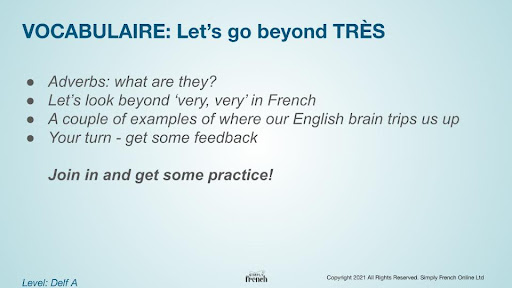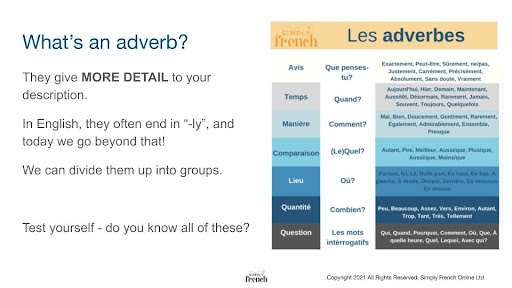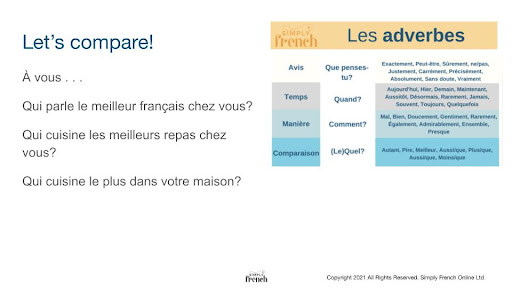How to use très in French language
Sep 25, 2023
Constantly sticking to easy vocabulary in French? Always using ‘très’? If it’s getting a bit repetitive. Let’s talk about adverbs.
In this mini-lesson, you’ll discover:
- Adverbs: what are they?
- Let’s look beyond ‘very, very’ in French
- A couple of examples of where our English brain trips us up

What’s an adverb?
Have you ever asked yourself what an adverb is? First, they tend to end with “ly” like gladly, quickly, incredibly, gently…
Basically, when you add details to a verb, it’s an adverb. Let me show you with examples:
- Je mange >>> I’m eating.
Here, it’s basic. You can observe a subject and an action but we don’t have any details.
Now, let’s have fun with some adverbs with the same sentence:
- Je mange sainement >>> I’m eating healthy.
- Je mange rapidement >>> I’m eating quickly.
- Je mange tranquillement >>> I’m eating quietly.
With adverbs, you get a better idea about the action. In the following sections, you’ll see the various categories of adverbs…

What are opinion adverbs in French?
While adverbs end with “ly” in English, they usually end with “ment” but not always!
Let’s see some examples of adverbs to express your opinion.
If the question is “Que penses-tu de….?” (What do you think of…?), you could expand with an adverb or answer with one word like this:
- exactement >>> exactly.
- précisément >>> precisely.
- carrément >>> totally.
- absolument >>> absolutely.
- justement >>> justly.
- vraiment >>> really.
- sans doute >>> probably.
- peut- être >>> mayby.

Main French time adverbs.
Are you willing to give information about time or frequency? You will opt for a time adverb. These don’t really follow the mold. Instead, they are pretty irregular, unique…You’ll have to memorise them:
- aujourd’hui >>> today.
- hier >>> yesterday.
- demain >>> tomorrow.
- maintenant >>> now.
- jamais >>> never.
- rarement >>> rarely.
- souvent >>> often.
- quelquefois >>> sometimes.
- toujours >>> always.
- aussitôt >>> immediately.
- désormais >>> from now on.
Oui! You have to learn them but surely (adverb!) you say them every day, therefore, they will easily (adverb!) stick in your head!

How often do you use manner adverbs in French?
This may be the kind of adverb you use the most because we love to describe actions, the speed if it’s well executed or not…Since humans have their own way of doing something, adverbs allow us to differentiate…
Here are some examples for you:
- mal >>> badly.
- bien >>> well.
- doucement >>> quietly, softly.
- gentiment >>> kindly.
- différemment >>> differently.
- vite >>> fast.
- délicatement >>> carefully.
In full sentences, you will have this result:
- Je parle très mal l’allemand >>> I speak German badly.
- Il joue bien au piano >>> He plays the piano well.
- Nous dessinons doucement >>> We are drawing softly.
- Tu souris gentiment >>> You kindly smile.
- Vous pensez différemment >>> You think differently.
- Elles marchent vite >>> They walk fast.
- Ils écrivent délicatement >>> They write carefully.
Oui! You have to learn them but surely (adverb!) you say them every day, therefore, they will easily (adverb!) stick in your head!

Adverbs of Comparison in French.
When you compare 2 things or people, you can either compare their appearance, qualities…If you use a verb, you’ll surely have an adverb.
A few adverbs of comparison :
- meilleur >>> better.
- mieux >>> better.
- pire >>> worse.
- autant…que >>> as much as
- aussi…que >>> as…as.
- plus…que >>> more…than.
- moins…que >>> less…than.
In full sentences, you will have this result:
- Il fait meilleur aujourd’hui: il y a du soleil >>> The weather is better today: it’s sunny.
- Il joue mieux au piano qu’à la guitare >>> He plays the piano better than the guitar.
- Nous dessinons pire que des enfants >>> We are drawing worse than children.
- Tu travailles autant que moi >>> You work as much I do.
- Vous pensez plus vite qu’un robot >>> You think faster than a robot.
- Elles marchent moins vite avec la pluie >>> They walk less rapidly with the rain.
- Ils écrivent aussi souvent que possible >>> They write as often as possible.
Simply remember that adverbs go hand in hand with verbs. Thus you don’t compare the object(s) or people but how they work.
In case you wish you review the comparison in French, this mini-lesson is perfect for you:
How and when to choose MEILLEUR and MIEUX

Give the location in French with adverbs.
Where is it happening? Basically, it’s when you indicate a place but with a verb. First, let’s have a look at some adverbs of place in French:
- ici >>> here.
- là >>> there.
- partout >>> everywhere.
- nulle part >>> nowhere
- en haut >>> upstairs / above.
- en bas >>> downstairs / at the bottom.
- à gauche >>> on the left.
- à droite >>> on the right
- devant >>> in front
- derrière >>> behind
Let’s have them in full sentences:
- Il habite ici >>> He lives here.
- Il travaille là, dans cet immeuble >>> He works there, in this building.
- Nous voyageons partout en Europe >>> We travel everywhere in Europe.
- Tu étudies nulle part >>> You study nowhere.
- Elles dorment en haut >>> They sleep upstairs.
- Ils écrivent en bas de la page >>> They write at the bottom of the page.
- Ils tournent à gauche >>> They turn on the left.
- Je conduis à droite >>> I drive on the right.
- La fille s’asseoit devant >>> the girl sits in front.
- Le garçon s’asseoit derrière >>> the boy sits behind.

Quantities and French Adverbs.
We all mention quantities every day. Therefore, you should be able to play with the adverbs of quantity. Maybe you didn’t know it but oui! They are adverbs.
Here you go :
- peu >>> a little.
- assez >>> enough.
- beaucoup >>> a lot.
- autant >>> as many… as
- environ >>> around.
- trop >>> too much / many.
- tant >>> so much / many.
- tellement >>> so much
In context, you will obtain the following:
- Il fait un peu frais cet été >>> It’s a bit chilly this summer.
- Il joue assez au piano pour son âge >>> He plays the piano enough for his age.
- Nous dessinons beaucoup le soir >>> We draw a lot in the evenings.
- Tu travailles autant le week-end >>> You work as much on weekends.
- Elles marchent environ une heure par jour >>> They walk around one hour per day
- Ils écrivent trop sur leur smartphone >>> They write too much on their smartphone.
- J’aime tant les pâtisseries françaises ! >>> I like French pastries so much!
- Julia aime tellement la France qu’elle a acheté un appartement à Toulouse >>> Julia likes France so much that she bought an apartment in Toulouse.
If you are still confused with “tant” and “autant”, I have you covered in this mini-lesson:

Question words are actually adverbs!
Did you that these words to use for questions are actually adverbs? In case, you forgot them in French, I’m giving you the list:
- qui >>> who.
- quand >>> when.
- pourquoi >>> why.
- comment >>> how.
- où >>> where.
- que >>> what.
- à quelle heure >>> what time.
- Quel >>> which.
- Lequel >>> which one.
- Avec qui >>> with whom.
In full questions, you’ll have something like this:
- Qui vient ce soir ? >>> Who’s coming tonight?
- Quand prends-tu l’avion ? >>> When are you flying?
- Pourquoi tu ne manges pas ? >>> Why aren’t you eating?
- Comment tu écris ce mot ? >>> How do you write this word?
- Où vont les enfants ? >>> Where are the children going?
- Que penses-tu de ce tableau ? >>> What do you think about this painting?
- À quelle heure ils arrivent ? >>> What time are they arriving?
- Quel livre tu préfères ? >>> Which book do you prefer?
- Lequel vas-tu acheter ? >>> Which one are you going to buy?
- Avec qui elle va au concert ? >>> With whom is she going to the concert?

In a nutshell, there are different categories of adverbs: opinion, time, manner, question, comparison, place, quantity…but they all go with a verb.
French regular adverbs end with “ment”. However, there exist many irregular ones. Do not try to learn all of them.
Practice with your own examples and see how it goes. Show me some of them if you wish. I’d be happy to help!
Free Masterclass
Learn my 4 step method of how to hold meaningful french conversations the R.E.A.L. way in just 30 minutes a day.
When you signup, we'll be sending you weekly emails with additional free content

